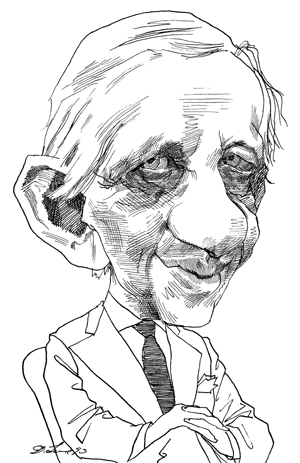Louis Begley published his first novel last year. It was autobiographical, about a young Jewish boy in occupied Poland being coached to pass as a Christian, and succeeding. It was called Wartime Lies. The new novel is in many ways a sequel, and could well be called Peacetime Lies. The hero is a postwar Jewish child immigrant. Back home his father was a respected lawyer and he himself “the Little Lord Fauntleroy of a Central European town.” In New Jersey they are disoriented and poor.
The boy, Ben, is an achiever. He wins a scholarship to Harvard, is accepted into the upper crust of student society, and then, even more surprisingly, into a Morgan Grenfell–type bank: “Only his mother and father were not astonished, in part because they did not fully measure the droll uniqueness of finding a postwar refugee from Central Europe within those precincts.” Ben marries a wellborn WASP divorcée and becomes an affectionate and conscientious stepfather to her twin daughters. By the time they are in their teens, the marriage has gone sour and his stepchildren reject him. These dispiriting events coincide more or less with his posting to the Paris branch of his bank in the early Seventies. The present begins there, but the past erupts into the telling of it, not in one big flashback, but bit by bit.
The narrator is Ben’s best friend, Jack. Jack is more a novelistic device than a character. His happy marriage functions as a foil to Ben’s loneliness, and he keeps a benign, but watchful, eye trained upon the roots and motivation of Ben’s every impulse and action—which are already under surveillance by Ben’s own less merciful eye. Jack is able to turn on Ben’s voice for the reader by quoting from his letters and from the notes he finds after his friend’s death. Each note is headed “‘Notaben’—the sort of pun of which Ben was monotonously fond.” The undertow in all of them is the unhappy knowledge that
his younger years had been emptied of meaning by the New World. He would shut a gate of bronze upon them. The storehouse of all the shame and vulnerability in his life would be locked; a private museum of curios with but one visitor, himself, to stare at the degraded and rejected lares and penates. Only new acquisitions and artful forgeries would be on show. Clothes make a man, and with even greater power, so do lessons learned in the right sort of childhood. Within the limits of verisimilitude, he would have both [my italics].
In fact Ben’s acquisitions and forgeries are psychological and intellectual only; he is too subtle—and perhaps too proud, though Begley is too subtle to allow him to say so—to go all the way to forging the actual circumstances of his past. Jack and, presumably, the rest of his circle know all about them if only because Ben “liked to joke that he was his own invention and therefore never could be certain how he really felt about anything or anybody.”
In Paris he throws himself into a varied and very sexy sex life, which fails to cure his chronic melancholy or his dread of being unattached and uncommitted; “Unfortunately, I can’t bear freedom. Antidote for freedom: multiply Ben’s obligations.” Quite soon he is introduced to Jack’s cousin Véronique, half French, half impeccably New England, with a loving nature, highly strung and highly sexed. Véronique is married to Paul, who beats her. There is a suggestion that she quite likes that, but she doesn’t like Paul, who is an unsympathetic and soulless man only interested in field sports. Ben begins a delirious affair with Véronique, erotic and tender as well: she wants to heal him, and he feels she might be able to. Soon she is ready to leave Paul. Ben hesitates: not because he does not truly love Véronique, but because he does not love himself enough to accept her love. There are minor impediments which he turns into serious scruples; he is sterile, and his experience with his stepchildren makes him worry about how things will go with Véronique’s little boy.
During Ben’s absence on an intercontinental business trip Véronique dramatically commits herself to him by declaring to her husband’s assembled family that she is leaving him. Ben, meanwhile, half deliberately allows the obstacles of necessary caution, postal vagary, and global time to keep him out of touch with Véronique. Her revenge is to get pregnant by a disgusting stranger who gropes her on a journey back from skiing in Verbier. Afterward she forces Paul to sleep with her, declares the child to be his, and patches up the marriage. When Ben returns to Paris, she agrees to lunch, furiously makes love with him afterward, then walks out. Some weeks later he kills himself: not as he had planned, by taking an overdose, but by diving from the Pont de la Machine in Geneva, where the Rhone flows through a grid. He had recently expatiated to Jack on the concept of defilement—“a condition worse than dishonor or disgrace”—in Pierre Jean Jouve’s novel Le Monde désert, whose hero dies in the same place in the same way.
Advertisement
The denouement is not as farfetched as it might seem in résumé because it is properly rooted in Véronique’s rather hysterical nature and in Ben’s existential predicament: “‘I myself am hell.”‘ What Milton’s Lucifer actually says is “myself am Hell.” It is uncharacteristic of Ben to get a quotation wrong; perhaps he does it under the strain of misery. He must be the most literate hero in recent literature, “not always able to keep literary references or analogies in check, so that a book that held his attention had a way of infiltrating his daily life.” Besides Jouve, the references include Rilke, Proust, Thomas Mann, Keats, Aragon, Mallarmé, Shakespeare, Yeats, Montherlant and probably many more. Rimbaud does not seem to figure, although his famous lines:
par délicatesse
j’ai perdu ma vie
would make a suitable epigraph for the novel. I don’t know whether anyone has ever tried a character like Ben before, but Begley gets a lot of mileage out of the literary infiltration: it defines Ben, adds depth to the de luxe texture of the novel, and is fun for readers who enjoy hunting down hidden allusions and unattributed quotations.
Ben’s suicide takes place under the sign of Pierre Jean Jouve, but his early days in Paris are “infiltrated” by Malte Laurids Brigge. Jack finds his friend’s identification with Rilke’s desolate hero a bit exaggerated, because while Malte lives in a squalid attic and knows no one, Ben has a chic apartment entre cour et jardin in the rue du Cherche-Midi, an office in the Place Vendôme, and frequents the society of well-heeled, well-connected bankers and lawyers, the Paris equivalent of his New York set. When Ben discovers he is suffering from a nervous disorder which affects his driving, he hesitates to consult a doctor because “the vision of Malte in his ‘tolerably decent suit’ among the doctors of the neurological ward of the Salpêtrière provided a literary, and therefore acceptable, reason for delay.” Still, even in his destitute condition, Malte has something for Ben to envy; the portraits and the ghosts in his ancestral home in Denmark. Jack misses that point.
If Rilke governs the opening and Jouve the end of Ben’s story, the middle is overseen by Choderlos de Laclos and Proust. Laclos is in charge of the erotic passages, which are numerous and assured: there is even one in which Ben props his copy of Les Liaisons dangereuses against the bottom of the German-Brazilian call girl who accompanies him to a seaside resort near Rio after he has triumphantly directed a multinational petrochemical deal there.
Proust, on the other hand, is all-pervading but invisible—or else I have missed an overt invocation to him. Begley’s novel is about the alienation of the displaced person and the impossibility, for the outsider, of ever “passing” completely, at any rate in his own eyes. But it deals also—and with enthusiasm—with the half-enamored, half-contemptuous engagement of its hero with society—society in Proust’s sense of le monde. It takes seriously the business of being bien élevé, comme il faut, à la page, of going to the right tailor, the right gunsmith, the right New York restaurant (where the waiter remembers your parents), the right beach, the right ski resort, and of dining with the right people—Joe Alsop when in Washington, for instance. Begley’s expertise on these matters matches his expertise on the international financial scene—the account of Ben’s petrochemical deal worked out in Rio de Janeiro, Tokyo, and Geneva is a triumph of exposition backed up by a feel for the excitement, exhaustion, exasperation, and exhilaration that go with deals.
The input of worldly savoir-faire makes enjoyable and instructive reading and provides cosmopolitan chic. It is not just glossy local color or showing off, though. The point of the novel seems to be the tension between, on the one hand, the world the hero has conquered and reluctantly values too highly, and, on the other, the secret, tragic knowledge in his heart that he had killed his past and thereby devalued his present. This is the classic predicament of the immigrant outsider, and usually presented as social and psychological. But taken to its logical conclusion it becomes a religious predicament. Of course, the all-knowing, all-seeing Ben recognizes this, and it only increases his misery. Just before his death he recalls an incident in the past when he couldn’t bring himself to tell the legend of Saint Martin to Jack’s loved and loving wife—“the story of the man who gave his coat to a beggar.” The reason, he sees, “is that I am without charity (therefore without love) and full of envy.”
Advertisement
Begley’s first novel was beautifully paced and controlled, but structurally undemanding. In spite of its tragic basis, it was a straightforward thriller, beginning at the beginning and ending at the end. With The Man Who Was Late the organization is as sophisticated as the content. It is a very clever, elegant, and readable novel, and very serious as well.
This Issue
January 28, 1993



